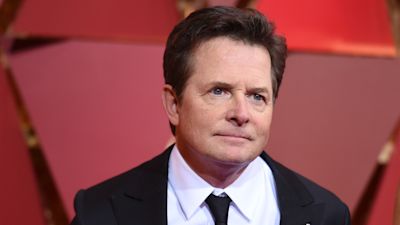Michael J Fox: Disease cures would happen faster if 'got at' in same way as Covid jab development

Fox has suggested 'guerrilla warfare attacks' on diseases and cancers would be the most effective way of finding cures for them
Michael J Fox has urged for scientists to adopt the same rapid working collaboration they harnassed to develop Covid vaccines when finding cures to life-limiting diseases and conditions.
The Back to the Future star was diagnosed with young-onset Parkinson's disease in 1991 at the age of 29 - and has been fighting for a cure for the progressive nervous system disorder since the launch of the Michael J Fox foundation a decade later.
Speaking to ITV News Art Correspondent Nina Ninaar, he said that the foundation has raised more than $1bn in research programmes since its founding in 2000, but more could be done to help tackle the disease.
ITV News Arts Editor Nina Nannar talks to Michael J Fox about his new show and life with Parkinson's
"We saw with the virus that when the smartest people in the world get together and say we are going to get this done- they get it done," he told ITV News.
"The vaccine was super quick. You don't appreciate how quick that was. And so if we can apply that same guerrilla warfare attack on diseases and conditions and cancers [and] just focus commando rays on it. Just like go at it."
His comments come on the opening night of the highly-anticipated Back to the Future musical adaptation at the Adelphi Theatre in the West End.
Fox, who was unable to travel to London tonight, described the play as "remarkable" and one which brings back nostalgic memories of the much-loved original 1985 movie, in which he starred as the time-travelling Marty McFly.
Knowing he could not attend, Robert Zemeckis and Bob Gale, the creators of the original film trilogy, shot a performance for Fox, 60, so that he could be part of the celebrations.
"I saw the entire production in a recent dress rehearsal. It was amazing. I was blown away by it," Fox said of the show.
'It always seemed like a musical to me. Marty seemed like a song and dance man to me,' Fox said
Ever since 1998, when Fox went public with his diagnosis of early-onset Parkinson’s disease, he has championed the benefits of holding an optimistic outlook on life.
True to form, he remained upbeat during the interview, saying he has been having a "good time" meeting up with friends, "relaxing" and writing.
Echoing sentiments expressed in his 2002 memoir Lucky Man, he added: "Parkinson's is a gift" that has allowed him "to step in and do something he would not have done otherwise."
But he acknowledged that the condition does "keep on taking".
The Back to the Future star said Parkinson's is a 'gift' that has come with many challenges
In the 1985 film, Marty McFly travels back to his home town in 1955.
Once there, he gets caught up in the soap opera lives of his own teenage parents, including his mother, who develops a crush on her future son.
The film, which co-starred Christopher Lloyd, Crispin Glover and Lea Thompson, was so successful that it spawned two more sequels in 1989 and 1990.
Fox told Nina Ninaar that the first time he saw the movie since 1987 was last Christmas when it happened to be playing on the TV when he went into a room to get tree wrapping.
'I had not seen it since like 1987', Fox said of Back to the Future
Fox continued acting after being diagnosed with Parkinson's in the 1990s, starring in series like Spin City and The Good Wife.
Despite subsequently becoming known best for playing Marty McFly, he was first propelled onto the national stage as Alex P. Keaton on the popular 1980s sitcom Family Ties.
Listen to our arts and entertainments podcast on the player below: